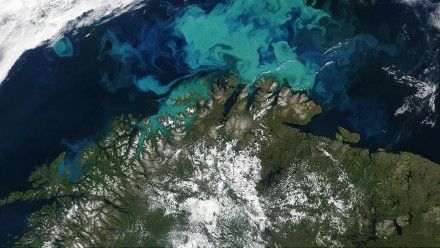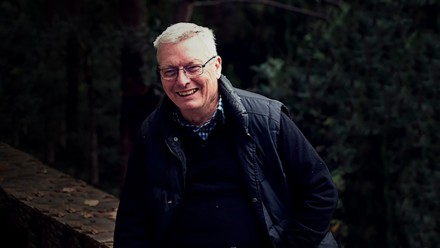Earth systems
Research on Earth systems considers processes of the atmosphere, ocean, cryosphere, biosphere and solid Earth, along with their interactions.
Movement of energy and water through the Earth system regulate Earth's climate, and affect the variability of climate and its extremes. This influences essential water resources, and can also be associated with hazards such as sea level rise caused by melting of ice and the accumulation of heat in the ocean. Understanding the processes that move energy and water through the ocean and atmosphere, and being able to model these processes in computer simulations, is critical for improving the accuracy of projections of future climate change.
Carbon cycles through the Earth system in ways that can both create emissions of greenhouse gases to the atmosphere and provide opportunities for mitigation. Changes in the carbon cycle affect climate, but also impact the natural ecosystems and the provision of food and fibre to people. Research spans the breadth of spatial and temporal scales of the carbon-climate system; from detailed field measurements of carbon stocks and impacts of land management systems, to the national and international policy context of the scientific issues. Outcomes from the research at all scales contribute to scientific evidence-based information for decision-making.
An important factor in the ability to predict of our future climate is the reconstruction of past climates from records captured in caves, coral reefs, ocean and lake sediments, ice cores, and trees. These past climates can be used to place current climate change and climate extremes in context with natural variability, and to improve the predictive capacity of climate models.
Researchers hail from a range of ANU Schools including Research School of Earth Sciences, Research School of Chemistry, Fenner School of Environment & Society, School of Archeology & Anthropology, School of Culture, History & Language, Research School of Pacific and Asian Studies and College of Law.
Leaders
Researchers
- Professor Nerilie Abram
- Associate Professor Cristopher Brack
- Professor Jochen Brocks
- Dr Matthew Brookhouse
- Dr Thang Bui
- Professor Geoff Cary
- Dr Ana Casas Ramos
- Dr Helen Adair Cleugh
- Dr Matthew Colloff
- Associate Professor Barry Croke
- Associate Professor Kim Cunio
- Professor Katherine Daniell
- Mr Clem Davis
- Professor Patrick De Deckker
- Quanling Deng
- Professor Stephen Eggins
- Professor David Ellis
- Professor John Evans
- Dr Stewart Fallon
- Professor Graham Farquhar
- Dr Ian Fry
- Kendra Gonzales
- Emeritus Professor Ross Griffiths
- Professor Thomas Griffiths
- Professor Simon Haberle
- Dr Rebecca Hamilton
- Dr Rhys Hawkins
- Professor Andy Hogg
- Dr Mark Hoggard
- Professor Michael Hutchinson
- Emeritus Professor Anthony Jakeman
- Dr Chengxin Jiang
- Dr Shimona Kealy
- Benedict Keaney
- Professor Penelope King
- Dr Steven Lade
- Dr Voon Hui Lai
- Dr Aparna Lal
- Professor Kurt Lambeck
- Dr Naomi Langmore
- Professor David Lindenmayer
- Professor Janette Lindesay
- Dr Nicola Maher
- Dr Jennie Mallela
- Dr Rebecca McGirr
- Dr Frank Mills
- Professor Craig Moritz
- Dr Adele Morrison
- Dr Marc Norman
- Prof Sue O'Connor
- Dr Bradley Opdyke
- Susan Orgill
- Professor Bradley Pillans
- Dr Matthew Prebble
- Professor Michael Roderick
- Dr Callum Shakespeare
- Dr Janelle Stevenson
- Professor John Taylor
- Dr Paul Tregoning
- Associate Professor Takuya Tsuzuki
- Professor George Wilson
- Dr Nicolas Younes
Students
2022
Response of the East Antarctic Ice Sheet to past and future climate change, Chris R Stokes, Nerilie J Abram, Michael J Bentley, Tamsin L Edwards, Matthew H England, Annie Foppert, Stewart S R Jamieson, Richard S Jones, Matt A King, Jan T M Lenaerts, Brooke Medley, Bertie W J Miles, Guy J G Paxman, Catherine Ritz, Tina van de Flierdt and Pippa L Whitehouse, Nature.
Humidity gradients in the air spaces of leaves, Suan Chin Wong, Martin J Canny, Meisha Holloway-Phillips, Hilary Stuart-Williams, Lucas A Cernusak, Diego A Márquez and Graham D Farquhar, Nature Plants.
Unfortunate diversions: a policy discourse analysis on the adjustment of the volume of water returned to the environment in the Murray-Darling Basin, Australia, Isobel Bender, Matthew J Colloff, Jamie Pittock, Carina Wyborn, Australasian Journal of Water Resources.
Mind the Gap! Reconciling Environmental Water Requirements with Scarcity in the Murray–Darling Basin, Australia, Matthew J Colloff and Jamie Pittock, Water.









